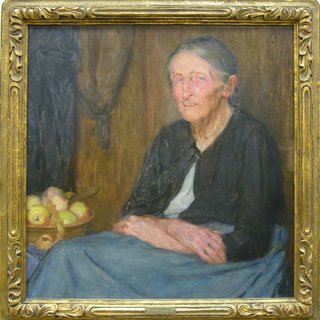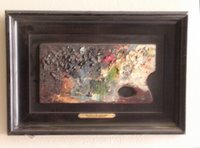Oskar Gross and the Emperor
 "Grandma from the Smokies" by Oskar Gross
"Grandma from the Smokies" by Oskar GrossThe following feature article was written by C.J. Bulliet – Chicago Daily News, April, 1935:
Oscar Gross confesses that his art religion has been not to disappoint his father, who was a Viennese architect and engineer of culture and high social standing. Such filial piety, of course, is most laudable. But it has its dangers, and in the case of Mr. Gross I have an awful fear that, in the absence now of his father, he has transferred, without knowing it, this parental allegiance to the grave and learned “Tree Studio bunch” his artist associates in Chicago. He scoffs and he scolds when they tell him “it isn’t done in our set” when he kicks over the traces with something spontaneous and a little wild. But he doesn’t do it again – for quite a while.
His father wanted him to be an architect, but he became a portrait and figure painter instead. Now he wants to paint the victims he sees all around him of “social conditions” as they exist since the mighty upheaval of 1929 rather than the staid and stately sitters who have made a path to his studio door. He’ll do it as soon as he can disentangle the “Tree Studio bunch” from his hair – which may be never. But if he does, you’re going to see some pictures of Chicago derelicts as they are – not feeble imitations of Russians and Mexicans that clutter our “American scene” shows.
Gross, born in Vienna in 1872, was prenatally destined to be an American, if you’re naive enough to believe in prenatal influences. His mother had lived in New York for five years, when her wealthy father was exiled with his family for participating in the uprising of 1848 which also sent Carl Schurz to these shores. After the amnesty, he went back a poor man, the ancestral estate having been confiscated. But his daughter didn’t forget. America and Oskar Gross was rocked to sleep to American lullabies.
Oskar’s father, an aristocrat, belongs to a family who been on the other side of the uprising in 1848,led by students and young intellectuals seeking the betterment of social conditions. However, he personally was of liberal mind, and he not only married the daughter of the returned exile, but gave up all claims to family titles and privileges to make his own way as engineer and architect. He founded industrial art schools in Vienna, supported first by guilds, but taken over later by the state.
Oskar’s talents became apparent in the nursery. He scorned “bought toys” preferring to design and make his own. He grew up with the full intention of following his father’s wishes that he become an architect. But, once enrolled formally as a student, he found the mathematicl routine dull, and looked withlonging eyers toward the Imperial Academo of Fine Arts . H tok the examination for entrance and was one of thiry-two applicants out of 300 who were accepted.
(incidentally, and without reference to Mr. Gross, it was this examination though in another year, that Adolf Hitler, another Austrian, “flunked”. Had Hitler passed, he might have developed into a portrait painter in Vienna or Chicago, instead of a fuehrer of Germany.)
At the end of four years, Oskar Gross had made such progress along with five others of the thirty-two, that he was given the use of a big studio, rent free, with other expenses allowed , among which was $50 a year for model hire.
This luxury he forfeited, however, when it was found he was making enough money with his art to live that way anyhow. He had been to Munich, for instance, on a painting commission, and his professors threw portrait work his way. After two more years in the school, he graduated with the biggest prize, and went into the world with about $1500 besides earned from his portraits.
He took a handsome and expensive studio in Vienna, again against his religion – that is to say, against the best advice of his cautious father. He was elected a member, in full standing of the Association of Viennese Painters and Sculptors, which put him on a par with his professors and prevented him taking further jobs from these, now his colleagues, who had been continuing their assistance even after his graduation. He discovered before long the wisdom of his father’s advice, and was forced to give up his studio. As a student he could make money – as an “artist” he couldn’t, yet.
Having a sense of humor, which he still possesses in abundance, he became a contributor of humorous sketches with text to the Munich comic paper, “Fliergende Blaetter” For eleven months, they sent his jokes back with polite rejection slips, and then, all at once, right-about faced, and not only bought his stuff but made him a staff contributor.
Slowly, he was pulling himself out of his slough of despond, getting now ad then a portrait commission, sometimes from nobles and even a prince.
Then , in 1898, he won a competition to do murals for the Hungarian State Pavilion being designed for the Paris exposition of 1900. His sketch of Hungarian peasants with horses – horses are an “obsession” with Gross – was executed in violet ink. Not only was his sketch accepted, but the plans of the whole pavilion were altered to follow out his idea, and in the finishing of the interior, the tints were made to conform. He was called to Paris personally to superintend the job.
His work on the pavilion attracted the attention of the Chicago architect, Daniel H. Burham, who invited him to come here to decorate some of his buildings. Gross responded the following year, reluctant to leave Vienna and a career of portrait painting he felt was opening and in June, 1903, he made his Chicago debut. He was thus 32 years becoming the American his mother had destined him to be. One practical result of her enthusiasm for the New York of fiver years of her girlhood was that she had given hi a pretty good grounding in English so he arrived with fewer of the foreigners’ difficulties.
He was financially successful for a time, until Burnham died and Sullivan went to the wall. Then, as he puts it, “the department stores entered the building decoration trade” making it no longer attractive for the established artists drawing big fees.
In 1911, Gross participate for the first time in a painter exhibition at the Art Institute or Chicago. Before that he had exhibited with the architects in local shows.
Participation in the painters’ show meant that he was resuming his art life where he left off in Vienna, whe he won the prize for the Hungarian pavilion mural. He would devote his life, thenceforth, to painting portraits and figures – a program from which he hasn’t swerved, and which has brought him financial success. He has made trips to the Smokies and to other fairylands of the artists, but he prefers his Chicago studio There are plenty of interesting portraits to be painted here – portraits and figure types.
About that wild streak in his nature, that occasionally flares up to the consternation of the grave conservatives with whom he is allied, the “Tree Studio Bunch”, it mustn’t be forgotten that one of his immediate ancestors was a Viennese revolutionist, exiled, and that another, on the other side, while loyal to the emperor, brushed aside his ‘aristocracy’, became an engineer and married the daughter of the revolutionist.
Also, Oskar Gross, while a graduate, after six years of the Imperial Academy at Vienna, participated, as a charter member, in the Vienna secession -- one of those early movements in the Germanic countries that paralleled the French ‘modern’ movements. The Vienna secession looked admiringly to the Swiss Hodler, whose man with a red beard you can see in the Birch-Bartlett collection at the Art Institute.
Again, Gross scandalized his professors the very year of his graduation from the academy by “talking back” to less a personage than the Emperor Francis Joseph. He had sent to the Vienna spring show a painting of a religious procession in Vienna, with thirty girls in the parade, concentrating on the girls, and only suggesting the head of the procession moving out of the canvas. The emperor admired the picture, and asked that the artist be presented.
“Mr. Gross”, he said, “I hope you keep up your Vienna spirit and continue to paint Vienna pictures”
“But I have got absolution from my sins for the next twenty-vive years at least” Gross flashed back, “by painting thirty little girls”
The emperor laughed – the academy dignitaries were horrified, and assailed Gross ferociously after Francis Joseph left. But on two later occasions, Gross found himself in the presence of the emperor. Both times, Francis Joseph smiled cordially, and without being prompted, addressed him as “Mr. Gross”
(note: this newspaper article was originally illustrated with a reproduction of the painting at the top," Grandma from the Smokies", which was given to the Vanderpoel museum in 1940)


1 Comments:
Nice find, Chris.
Post a Comment
<< Home